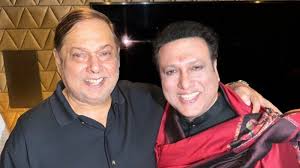Govinda destroyed his career by surrounding himself with pandits, David Dhawan poisoned his mind: Pahlaj Nihalani calls actor ‘nasamajh’

From Superstardom to Silence
Govinda was once the undisputed king of comedy in Bollywood. In the ’90s, he ruled the box office with back-to-back hits and unmatched energy. His iconic collaborations with David Dhawan, including Hero No. 1, Coolie No. 1, and Raja Babu, defined an era of slapstick comedy.
However, that success didn’t last. By the mid-2000s, Govinda’s presence on the big screen had declined sharply. Now, Nihalani sheds light on what he believes went wrong.
Pandits Over Producers: A Dangerous Shift
According to Nihalani, Govinda became increasingly superstitious at the height of his fame. He reportedly began making film choices based on astrological guidance rather than scripts or directors.
“He stopped taking decisions on merit. Every film, every meeting depended on what the pandit said,” Nihalani stated.
The result? Govinda turned down meaningful roles and committed to weak projects, all based on planetary alignments and spiritual advice. This reliance, Nihalani argues, eroded the actor’s grip on his own career.
David Dhawan’s Role in the Downfall
While their professional partnership gave rise to several blockbusters, Nihalani claims David Dhawan was a negative influence on Govinda’s career.
“David poisoned his mind,” Nihalani alleged. “He made Govinda believe he didn’t need anyone else.”
This growing dependence on Dhawan reportedly made Govinda arrogant and isolated him from other filmmakers who once supported him. When the Dhawan-Govinda collaboration faded, the actor was left without strong industry relationships.
Labeling Govinda ‘Nasamajh’
In a pointed remark, Nihalani described Govinda as “nasamajh”, implying that he lacked maturity and foresight. The term, coming from someone who once backed Govinda’s early films like Ilzaam and Shola Aur Shabnam, speaks volumes about the level of disappointment.
“He had everything—charm, talent, mass appeal. But he failed to value people who stood by him,” Nihalani said.
Govinda, he continued, lost track of what truly mattered in the film business: good scripts, strong relationships, and a humble attitude.
Ego, Isolation, and Missed Opportunities
According to Nihalani, Govinda’s decline wasn’t immediate. It was a slow burn, fueled by ego, misplaced trust, and a growing disconnect from reality. As he withdrew into a world of superstition and selective company, his career choices worsened.
He missed major projects, refused good offers, and developed a reputation for being difficult to work with. His once-loyal fanbase began to move on, while newer actors claimed the spotlight.
Could Govinda Have Recovered?
Nihalani believes that even with poor decisions, Govinda had a chance to bounce back. However, he failed to reinvent himself or adapt to changing times. Unlike peers like Anil Kapoor or Akshay Kumar, who stayed relevant by evolving, Govinda clung to the past—and to people who did not guide him well.
“If only he had listened to the right people at the right time, his story would’ve been very different,” said Nihalani.
Final Word
The narrative of the Govinda career ruined by pandits and poor influence is not just a personal tragedy but a cautionary tale in Bollywood. Success in cinema, as Nihalani suggests, requires more than talent—it demands clarity, self-awareness, and trustworthy mentors.
Despite his fall from stardom, Govinda remains a name that once lit up Indian cinema. Yet, as Pahlaj Nihalani put it, “He was a diamond who didn’t know how to shine without scratching himself.”






